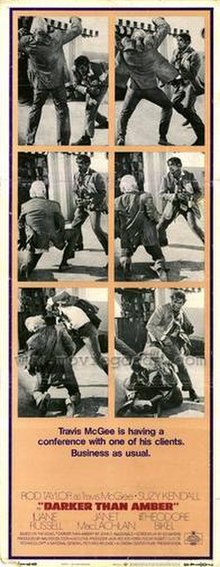Darker than Amber (film)
| Darker than Amber | |
|---|---|

Original poster
|
|
| Directed by | Robert Clouse |
| Produced by |
Jack Reeves (executive producer) Walter Selzer (producer) |
| Written by |
John D. MacDonald Ed Waters |
| Starring | Rod Taylor |
| Music by | John Carl Parker |
| Cinematography | Frank V. Phillips |
| Edited by | Fred A. Chulack |
| Distributed by | National General Pictures |
|
Release date
|
August 14, 1970 |
|
Running time
|
96 min |
| Country | U.S. |
| Language | English |
| Budget | $2,607,328 |
| Box office | $1,621,897 |
Darker than Amber is a 1970 film adaptation of John D. MacDonald's mystery/suspense novel, Darker than Amber. It was directed by Robert Clouse from a screenplay by MacDonald and Ed Waters. It starred Rod Taylor as Travis McGee. Darker than Amber and The Empty Copper Sea (adapted as the film Travis McGee (1983) starring Sam Elliott) remain the only McGee novels adapted to the big screen as of 2013. The film also marked the final onscreen appearance of actress Jane Russell prior to her death in 2011, with the exception of a documentary appearance in 2007.
The film is faithful to the plot of the novel. McGee and his close friend Meyer are fishing underneath a bridge when a young woman (a former prostitute named Vangie) is thrown off the bridge, weighted with a barbell around her ankles. McGee dives in and saves her, and is surprised when she insists that he not contact the police. She admits that she was nearly killed due to her involvement in a prostitution ring and a murder scheme. The trio travels to Nassau to investigate her would-be murderers, who work in male/female pairs to lure rich, lonely men traveling on cruise ships into their confidence, rob them, and then toss them overboard to drown. McGee and Meyer set out to dismantle the operation.
Other actors considered for the role of Travis McGee were Jack Lord and Robert Culp. John D. MacDonald pushed for Steve McQueen or Vic Morrow. The movie was shot on location in Florida and Nassau.
Though it did not gross well in the box office, Darker than Amber earned many positive reviews. Roger Ebert gave the film 3.5 stars out of a possible 4, writing that Taylor, somewhat playing against type by showing more warmth than his usual taciturn performances, was well-cast as McGee and that the plot managed to transcend standard detective cliches to become "a surprisingly good movie".The New York Times also gave the film reserved praise, stating that the screenplay lagged in parts despite the good material to work from (in the original novel), and that the real star of the film was its Florida setting.
...
Wikipedia
